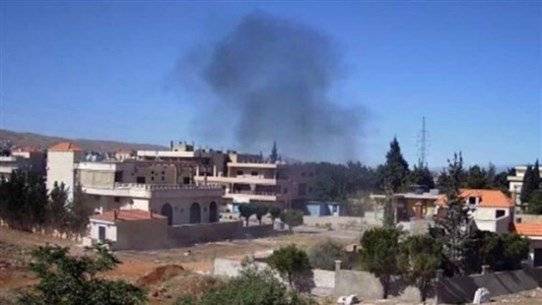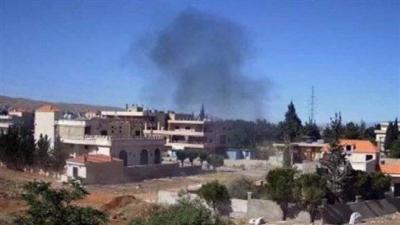The Lebanese scene reflects concerns that the political class that "survived" the elections will continue its "small battles" atop "leaky baskets," which many fear are now controlling the possible solutions in politics, finances, and their "sisters." There is also a focus on the ongoing operation to capture one of the most notorious "drug barons" in the "Land of Cedars," known as "Abu Salla."
Events from the operation carried out by the Lebanese army on Friday in the Shrawneh neighborhood of Baalbek, which included clashes with Abu Salla's group (Ali Munther Zaiter) resulting in the death of a soldier and injuries to five others, highlight the significant challenges facing legitimate forces in asserting control, even regarding "local security," over lawless hideouts. Many in Lebanon and abroad suggest that these hideouts have a "collaborative relationship" with existing powers that either turn a blind eye for tribal and familial reasons—fearing confrontations that may lead to clashes with parts of their host environment—or benefit directly or indirectly, as claimed by the enemies of "Hezbollah," which has consistently denied any involvement in the "Republic of Drugs" sprawling across the Bekaa and along the Lebanese-Syrian borders.
The confrontation fought by Abu Salla's gang, one of the most wanted individuals with hundreds of warrants, who has turned into a sort of "emperor of drug trade"—whose "links" are intertwined in a "complete chain" of manufacturing, trading, and exporting—revealed the extent of fortifications built by "Lebanon's drug lords" in their "fortresses" concentrated in areas outside the state's control in the Bekaa Valley. Zaiter had fortified his "capital" in the Shrawneh neighborhood with advanced defense lines, surveillance cameras, and early-warning systems, as well as sophisticated devices that allowed him to evade the element of surprise that would have given the military an advantage. The clash ignited within Abu Salla's headquarters, resembling a "close combat" scenario between army elements and armed militants, with the use of automatic weapons and hand grenades. Surrounding the house witnessed a "battle" with a group attempting to support "the number one wanted man," targeting the army unit with rocket fire, resulting in the injuries sustained by military personnel.
While the military reinforcements the army brought—including a helicopter and a drone—allowed for the arrest of suspects (alleged associates) and the confiscation of a quantity of military weapons and ammunition, as stated by the army's command, Abu Salla's fate remains unclear. A military source confirmed to "Al-Rai" that "the army continues its search operation for the wanted man who managed to escape," adding that the search includes the fugitive and anyone who assisted him in leaving the area following the clash with the army, which led to the martyrdom of one serviceman and five additional injuries, one of which is serious.
The operation was meticulously prepared to capture him, as he is one of the largest wanted suspects for drug trafficking, emphasizing that this was not a large-scale operation against drug dealers but rather a focused effort that required significant temporal and intelligence preparation to capture him as the head of drug trade. He confirmed that the army demolished what is called the "quartier" of his house (Abu Salla) and the homes of his two important aides, who were also arrested and are significant within this network, where drugs were prepared for sale and trade.
Reportedly, intelligence arrested a person in Baalbek suspected of providing medical assistance to Abu Salla during his escape from the raid, which suggested he was injured. The town of Boudey (west of Baalbek) also witnessed a grand funeral for army sergeant Zain Al-Abidin Shams, who fell in confrontations with Abu Salla's group.
**"Abu Salla" Breached the Drug Enforcement Office**
Reports in Lebanese media linked Abu Salla to a dangerous breach of the Central Drug Enforcement Office, whereby he, with facilitation from within the office, managed to steal a significant quantity of cocaine from the office's seized materials. A former president of the office and seven officers were charged with "negligence and violation of military instructions," and elements from the office were charged with stealing about nine kilograms of cocaine from the office's store for sale to Abu Salla. This was discovered after an inventory revealed a "box" had been torn about seven centimeters, leading to the discovery of a "scandal" involving the disappearance of the cocaine after breaking the seals.
**"Salla"... "Abu Salla"**
Abu Salla got his nickname during the phase he managed drug trade in the Zaiteria-Fanar region (northeast of Beirut), where he was accustomed to selling "his goods" of various types through a "basket" that would "descend" from his apartment whenever he wanted to finalize a "deal." Since "settling" in the Shrawneh neighborhood about six years ago, he focused his activities and strengthened his position until he became the largest source of drugs in the capital and its surroundings, with among the most famous items he sells being narcotic pills ranging from "silvia," to XTC, cocaine, and Captagon among others.
Abu Salla is wanted by about a thousand warrants and security documents, and he has been sentenced in absentia for crimes ranging from drug trafficking through a wide network (including women and workers in various transport means) and selling them to university and school students, along with kidnapping and robbery offenses, forgery, and firing on security and military forces.
**"Control Room"... and Early Warnings**
Investigations revealed "beyond imagination" information about "Abu Salla," notably:
- He uses his home in the Shrawneh area as a meeting place with major drug dealers and wanted individuals to coordinate drug trafficking and promotion operations.
- He possesses a control room within his home that manages multiple surveillance cameras spread across all entrances of the Shrawneh region, forming, along with the other wanted individuals, an operations room to monitor incoming security patrols towards their locations.
- He has a facility for cooking and manufacturing drugs (cocaine, silvia, hashish) behind his home in Shrawneh.
- He runs a trading and promoting office for narcotics around his house.
**Kidnapping an Employee of "Al-Sabah Brothers"**
Abu Salla's name surfaced over a month ago in association with the suspected kidnapping of an accountant for the "Al-Sabah Brothers" company (of Egyptian nationality), before a force from the Lebanese army later freed him. During that time, a large quantity of drugs was destroyed following a raid by the intelligence directorate in Baalbek on Abu Salla's workplaces in Shrawneh amidst the search for the Egyptian citizen, alongside reports of discovering equipment for Captagon manufacturing.
Abu Salla's denial of any association with the kidnapping did not prevent threats from him and other wanted individuals aimed at the heads of security agencies and military intelligence officials in Baalbek.
**A "Free Market" for Drugs**
About a year ago, Arab and international media became preoccupied with what resembled a "spread map" distributed by the "Syrian Observatory for Human Rights," reporting "14 factories on the Syrian side of the border with Lebanon," talking about "Hezbollah's involvement and Syrian militias in promoting the drugs produced within." The factories were distributed according to the observatory as follows: "three factories in Serghaya, two in each of Rankous and Assal al-Ward, and one factory each in Tel Feita, Bakh'a, Tufayl, Ma'diah, and Saboura, where products from those factories are sold in the region and exported to various Syrian areas beyond just regime areas."
The "Independent Arabic" described at the time that the areas in Syria adjacent to the Lebanese border, particularly the Qalamoun and Qusair areas, have turned into a "free market" for smuggling and illegal trades, especially drugs and hashish cultivation.
**Without a Mask**
It is well known about Abu Salla that he is one of the openly known "drug barons," who does not hesitate to post photographs of himself on social media, appearing in some while boasting about carrying weapons. After the operation executed by the Lebanese army, he posted a video on his Facebook page showing himself in four-wheel-drive vehicles with members of his gang. Clips also emerged portraying what seemed to be a rocket attack targeting the army's forces in front of his home. Following Russia's war on Ukraine, a banner emerged bearing a picture of President Vladimir Putin, along with the "Hezbollah" logo, signed by "Abu Salla."
**Lebanon's Escobar... the Most Dangerous**
Ali Zaid Ismail, or "Lebanon's Escobar," is a name that occupied Lebanon for a long time until he was killed in July 2018, along with seven others from his group during a clash with the Lebanese army in the town of al-Hamoudiyeh - Brital, northeast Lebanon. Ismail was wanted by 2,941 arrest warrants and was considered one of the most dangerous wanted individuals at that time.




